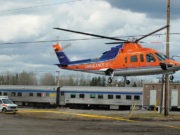Loss of control in-flight (LOC-I) has been identified by the International Civil Aviation Organization (ICAO) as one of three high-risk accident occurrence categories and has been one of the most significant causes of fatal accidents for many years. LOC-I usually occurs because the aircraft enters a flight regime that is outside its normal envelope, usually, but not always, at a high rate, thereby introducing an element of surprise for the flight crew involved. Issues related to loss of situational awareness and control of the aircraft during conditions of low speed, high pitch and high bank angle are included, as are weight and balance issues.
ADREP Occurrence Categories: LOC-I
Recent Fatal Accident History
| 2013 | 2014 | 2015 | 2016 | 2017 | TOTAL |
| 10 | 4 | 3 | 3 | 2 | 22 |
Source: Aviation Safety Network database
According to ICAO, LOC-I accidents represented only 3 percent of all accidents in 2015, but 33 percent of fatal accidents. International Air Transport Association (IATA) data for 2012-2016 show 30 LOC-I accidents resulting in 949 fatalities. While the overall rate of occurrence is low, 93 percent of LOC-I accidents result in hull losses and 90 percent incur fatalities.
Analysis
Loss of Control In-flight (LOC-I) Prevention: Beyond the Control of Pilots (IATA)
Loss of Control In-Flight Accident Analysis Report (IATA)
Airplane State Awareness Joint Safety Analysis Team Final Report, Analysis and Results (CAST)
Airplane State Awareness Joint Safety Implementation Team Final Reprot, Analysis and Recommendations (CAST)






